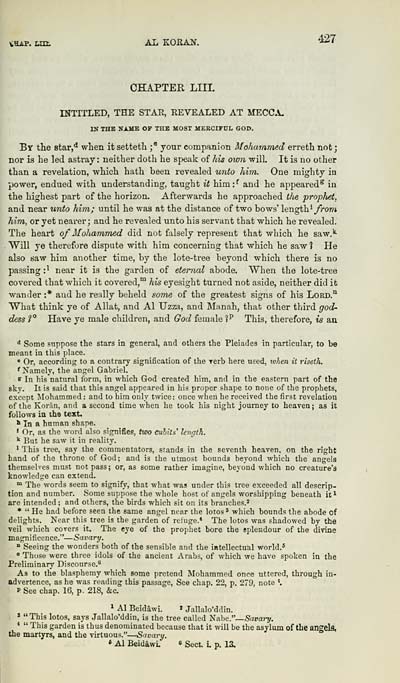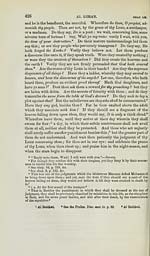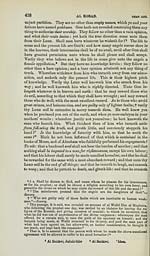Download files
Complete book:
Individual page:
Thumbnail gallery: Grid view | List view

427
CHAPTER LIIL
INTITLED, THE STAR, BEVEALED AT MECCA.
IK THE NAME OF THE MOST MEKCITUL GOD.
By the star,'* when it setteth ;" your companion Mohammed erreth not ;
nor is he led astray: neither doth he speak of his own will It is no other
than a revelation, which hath been revealed unto him. One mighty iu
power, endued with understanding, taught it him:^ and he appeared^ in
the highest part of the horizon. Afterwards he approached tlie prophet,
and near unto him; until he was at the distance of two bows' length* yVom
him, or yet nearer; and he revealed unto his servant that which he revealed.
The heart of Mohammed did not falsely represent that wliich he saw.*^
. Will ye therefore dispute with him concerning that which he saw? He
also saw him another time, by the lote-tree beyond which there is no
passing:^ near it is the garden of etemial abode. "When the lote-tree
covered that which it covered,™ his eyesight turned not aside, neither did it
wander :* and he really beheld some of the greatest signs of his Lord."
"What think ye of Allat, and Al Uzzji, and Manah, that other third god-
dess ?° Have ye male children, and God female 1^ This, therefore, is an
^ Some suppose the stars in general, and others the Pleiades in particular, to be
meant in this place.
* Or, according to a contrary signification of the Tcrb here used, tuken it riseth.
'Namely, the angel Gabriel.
B In his'natural form, in which God created him, and in the eastern part of the
sky. It is said that this angel appeared in his proper shape to none of the prophets,
except iNlohammed : and to him only twice: once when he received the first revelation
of the Koran, and a second time when he took his night journey to heaven; as it
follows in the text.
* In a human shape.
* Or, as the word also signifies, two cubits' lenrilh.
^ But he saw it in reality.
' This tree, say the commentators, stands in the seventh heaven, on the right
hand of the throne of God; and is the utmost bounds beyond which the angels
themselves must not pass; or, as some rather imagine, beyond which no creature's
knowledge can extend.
™ The words seem to signify, that what was under this tree exceeded all descrip-
tion and number. Some suppose the whole host of angels worshipping beneath it^
are intended ; and others, the birds which sit on its branches.*
* "He had before seen the same angel near the lotos * which bounds the abode of
delights. Near this tree is the garden of reluge.* The lotos was shadowed by the
veil which covers it. The eye of the prophet bore the splendour of the divine
magnificence." — Savary.
" Seeing the wonders both of the sensible and the iHtellectual world.'
» Those were three idols of the ancient Arabs, of which we have spoken in the
Preliminary Discourse.*
As to the blasphemy which some pretend Mohammed once uttered, through in-
advertence, as he was reading this passage, See chap. 22, p. 279, note '.
P See chap. 16, p. 218, &c
1 Al Beidawi. » Jallalo'ddin.
» " This lotos, says Jallalo'ddin, is the tree called Nabe."— Salary.
< " This garden is thus denominated because that it will be the asylum of the angelfl,
the martyrs, and the virtuous." — Savary.
* Al BeidawL « Sect. I p. 13.
CHAPTER LIIL
INTITLED, THE STAR, BEVEALED AT MECCA.
IK THE NAME OF THE MOST MEKCITUL GOD.
By the star,'* when it setteth ;" your companion Mohammed erreth not ;
nor is he led astray: neither doth he speak of his own will It is no other
than a revelation, which hath been revealed unto him. One mighty iu
power, endued with understanding, taught it him:^ and he appeared^ in
the highest part of the horizon. Afterwards he approached tlie prophet,
and near unto him; until he was at the distance of two bows' length* yVom
him, or yet nearer; and he revealed unto his servant that which he revealed.
The heart of Mohammed did not falsely represent that wliich he saw.*^
. Will ye therefore dispute with him concerning that which he saw? He
also saw him another time, by the lote-tree beyond which there is no
passing:^ near it is the garden of etemial abode. "When the lote-tree
covered that which it covered,™ his eyesight turned not aside, neither did it
wander :* and he really beheld some of the greatest signs of his Lord."
"What think ye of Allat, and Al Uzzji, and Manah, that other third god-
dess ?° Have ye male children, and God female 1^ This, therefore, is an
^ Some suppose the stars in general, and others the Pleiades in particular, to be
meant in this place.
* Or, according to a contrary signification of the Tcrb here used, tuken it riseth.
'Namely, the angel Gabriel.
B In his'natural form, in which God created him, and in the eastern part of the
sky. It is said that this angel appeared in his proper shape to none of the prophets,
except iNlohammed : and to him only twice: once when he received the first revelation
of the Koran, and a second time when he took his night journey to heaven; as it
follows in the text.
* In a human shape.
* Or, as the word also signifies, two cubits' lenrilh.
^ But he saw it in reality.
' This tree, say the commentators, stands in the seventh heaven, on the right
hand of the throne of God; and is the utmost bounds beyond which the angels
themselves must not pass; or, as some rather imagine, beyond which no creature's
knowledge can extend.
™ The words seem to signify, that what was under this tree exceeded all descrip-
tion and number. Some suppose the whole host of angels worshipping beneath it^
are intended ; and others, the birds which sit on its branches.*
* "He had before seen the same angel near the lotos * which bounds the abode of
delights. Near this tree is the garden of reluge.* The lotos was shadowed by the
veil which covers it. The eye of the prophet bore the splendour of the divine
magnificence." — Savary.
" Seeing the wonders both of the sensible and the iHtellectual world.'
» Those were three idols of the ancient Arabs, of which we have spoken in the
Preliminary Discourse.*
As to the blasphemy which some pretend Mohammed once uttered, through in-
advertence, as he was reading this passage, See chap. 22, p. 279, note '.
P See chap. 16, p. 218, &c
1 Al Beidawi. » Jallalo'ddin.
» " This lotos, says Jallalo'ddin, is the tree called Nabe."— Salary.
< " This garden is thus denominated because that it will be the asylum of the angelfl,
the martyrs, and the virtuous." — Savary.
* Al BeidawL « Sect. I p. 13.
Set display mode to: Large image | Transcription
Images and transcriptions on this page, including medium image downloads, may be used under the Creative Commons Attribution 4.0 International Licence unless otherwise stated. ![]()
| Early Gaelic Book Collections > J. F. Campbell Collection > Koran: or, Alcoran of Mohammed > (581) |
|---|
| Permanent URL | https://digital.nls.uk/77140486 |
|---|
| Description | Volumes from a collection of 610 books rich in Highland folklore, Ossianic literature and other Celtic subjects. Many of the books annotated by John Francis Campbell of Islay, who assembled the collection. |
|---|
| Description | Selected items from five 'Special and Named Printed Collections'. Includes books in Gaelic and other Celtic languages, works about the Gaels, their languages, literature, culture and history. |
|---|

